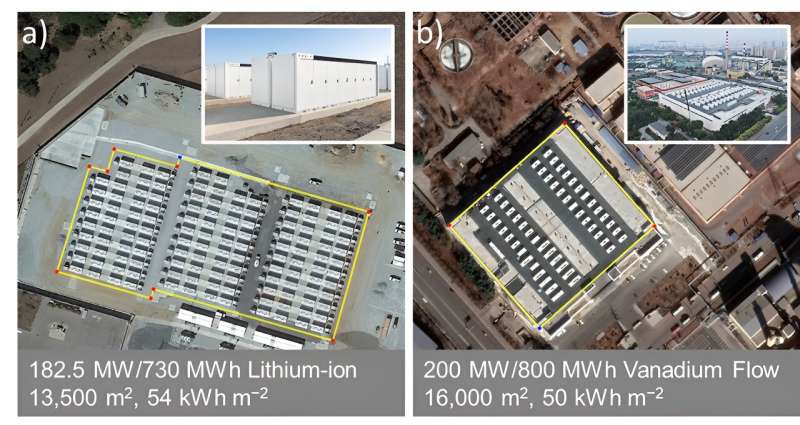- To enhance sustainable energy, large lithium-ion batteries are globally installed in power grids.
- They stabilize demands, but their placement and design require careful innovation for safety and efficiency.

To counter the sun’s absence at night and intermittent wind, large lithium-ion batteries have been installed globally in power grids. These batteries enable the use of solar energy in the evening, playing a crucial role in promoting a sustainable energy future.
During a heat wave last September, the California Independent System Operator (CAISO) successfully utilized its battery system. The batteries provided 3.3 GW, or 6.8% of the total power, as demand spiked with increased air conditioning use, stabilizing the grid and preventing blackouts in California.
Where do we put all those batteries?
Grid-scale battery energy storage systems (BESS) are typically located in rural areas, but demand is growing in populated regions due to imbalances in energy production and need. Congestion tariffs can increase costs, so BESS helps manage this without building new infrastructure. Lithium-ion batteries are generally safe, but with around 150,000 individual batteries in each large-scale unit, failure rates increase, potentially leading to significant hazards. These complexities highlight the need for careful consideration and innovation in the design and deployment of BESS.
Water-based electrolytes
The flammable electrolyte in modern lithium-ion batteries poses a key risk. A promising alternative for large-scale applications is using nonflammable water-based electrolytes. However, as the team notes, these offer only a fraction of the energy density that lithium-ion batteries provide. Redox flow batteries, using nonflammable water-based liquid electrolytes pumped through an electrochemical cell, are a promising and safe option for grid-scale storage. However, their low energy density is often cited as a major limitation of this technology.
Does it matter?
An examination of global megawatt-scale BESS revealed that energy capacity per area is often comparable between lithium-ion and flow batteries, even though it differs vastly at the cell level. This finding suggests that cell-level energy density may not be critical for grid-scale installations. Instead, the focus should be on cost and other factors like lifetime, scalability, manufacturability, recyclability, and supply chain safety, rather than the often-hyped metric of energy density.
Water-based batteries, being non flammable, can be excellent for vertical scaling in areas with limited land or densely populated regions, unlike current lithium-ion systems. The focus for these megawatt-scale solutions should be on safety, cost, lifetime, and manufacturability, rather than energy density, recognizing that no single battery technology will suit every use case.
Reference: David Reber et al, Beyond energy density: flow battery design driven by safety and location, Energy Advances (2023). DOI: 10.1039/D3YA00208J







